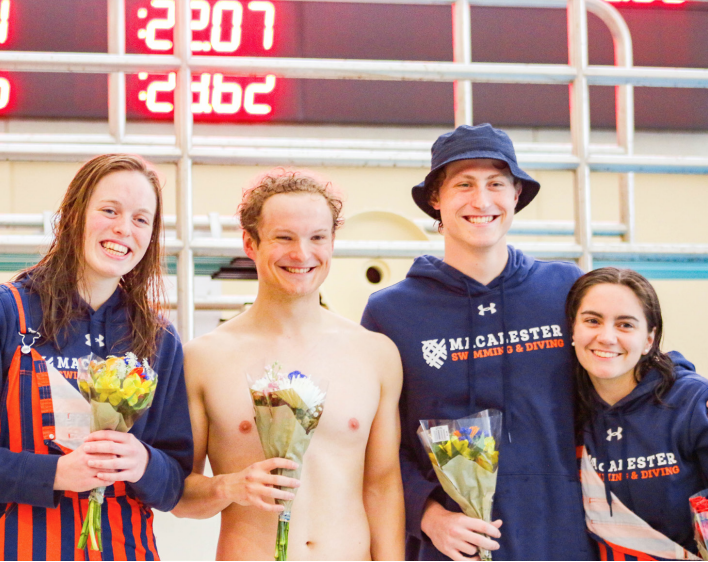
TMW: How did you guys start MacSUPER?
Muath Ibaid: So Hannah Graf Evans, a mutual friend, mentioned it in a MENA [Middle East North Africa] meeting. She said there had been a Palestinian org at Macalester at some point, and now it’s gone. And thought we should bring it back. So we got a couple people, went to Shish and sat there for hours trying to write a charter. Then this annoying kid [motions to Bessen] started coming to the meetings. He was talking gibberish in the meetings, using big words in classic Jacob style. Can you give a couple examples of those words?
MI: I can’t, it’s like studying for the SAT. Instead of saying, “Palestinians have tough lives,” he would say “Palestinians are suffering from postcolonial trauma.” He just has ways of making me not understand what he’s saying. But slowly he started making his way up my friends list.
What did he do to earn your respect?
MI: He showed up to meetings [laughs]. 90 percent of life is just showing up.
Jacob Bessen: That’s the 90 percent of life I’m succeeding at. So Hannah Graf-Evans actively played matchmaker with us. We were mutual colleagues before we were friends. I think for a while I played this malleable role as the token Jew. The thing is, because we’re tokenized so often as just Jew and Palestinian, we figure out how to make that tokenization dynamic [laughs]. Seriously, before we ever speak publicly, Muath is like, “Ok, you’re going to be the grumpy, angry Jew, and I’m going to be this outgoing, friendly Palestinian” [laughs]. We rework the dynamic a lot. It’s not always good cop/bad cop, but sometimes I’ll go, “Alright, Muath, this time you go in hot, and I’ll be the reasonable one.” Or, “You come in and drop hegemony four times and put them on the defensive.”
Does “hegemony” put them on the defensive?
JB: Yes.
So had MacSUPER existed before?
JB: From a budgeting perspective, it was a dormant organization that we revived.
MI: We weren’t frozen, we were gone. And my second semester first year, we brought it back, but of course we couldn’t budget right away.
At Mac, at a place where people would consider themselves progressive, what’s the view about the conflict that bothers you the most?
MI: One of the things that bothers me the most is when people say, “I don’t know enough; I’m not going to attend your meeting; I’m not going to take a stand.” With that it’s like, where do you start? We say our meetings are informational and their goal is to raise awareness, and you’re saying you don’t know enough, and you’re not going to take a stand, and you’re not going to attend the meeting. Then where are you going to get information? So we always tell people, please show up and be against us. That will make the meeting more fun. But please just show up and take a stand.
JB: When we were doing the org fair last year, I would watch first- years see that we were dealing with the Israeli-Palestinian conflict, and they would just viscerally drop to the ground and avoid me. I mean, that’s hilarious, but it shows how afraid people are of engaging in the conflict at all, like they have no right to engage, and that the stakes are too high. First of all, what are you participating in that doesn’t have high stakes? Just don’t stigmatize the conversation.
What was the most challenging moment for you both leading the org?
JB: Last year we had an incident in which a group from Minneapolis, a conglomeration of three different PR lobby groups, approached JStreetU about bring a presentation called “Difficult Conversations” to campus. And a variety of misinformation and scandals came out. What actually happened is that it was so curated that, from my perspective, it was a performance. Which is fine! At MacSUPER it is our goal to give voice to as many perspectives as possible. The issue is that they were trying to present themselves as the [entire] spectrum.
MI: JStreetU, the official sponsors on campus, reached out to us to see if we wanted to co-sponsor, and we said yes. We got a reply a couple of days later saying the original organizers of the event did not want us as co-sponsors. That was a “what the hell” moment. It turns out the off-campus organization claimed that MacSUPER as an organization had said anti-Zionist things in the past. That was based on a Google search and a blog post from 2004 that they found.
JB: Anyway, BriRo actually bought the event out using the Presidential Discretionary Fund for reasons of protecting academic freedom on campus. So it definitely escalated and we’re able to mobilize around it. In the end, it forced people who were interested in the intersection of academic freedom and equal rights to start attending and pay attention to MacSUPER.
JB: There’s also been a lot of internal debate — and this is important to shed light on — within MacSUPER about how to spend our Flexi Fund. This is the great date controversy. I think we should have dates and tea; that should be the cornerstones of our meeting, but Muath is not willing to shell out.
MI: Dates cost like a thousand dollars per piece of date.
What would you say about being leaders of a prominent org on campus for people thinking of becoming leaders? Are you just frustrated or is it also rewarding?
JB: Oh it’s super rewarding. I mean, MacSUPER was not a prominent org on campus when we started. We have big plans for this year, stuff we wouldn’t have even dreamed of a couple years ago.
MI: Also, I’m currently in the job search, and I can’t tell you how many workplaces ask you to emphasize leadership experience, and MacSUPER has been the single experience I talk about.
JB: At this point our leadership team knows each other really well, so I get a thrill out of our really effective cooperation and teamwork at this point.
MI: For good reason.
How has on-campus activism and participation changed during your time here?
MI: There’s clearly a drop in activism and participation. If you go to any prominent organization on campus, you will find that their leaders are mostly seniors and some juniors, which is natural to some extent. But we started this organization second semester my first year. When we were on the MacSUPER board sophomore year, a lot of other prominent organizations were led by sophomores. And since then, MacHope has died; MENA has died. There’s a change in the general culture of how this campus is functioning. Before, you would look up toward people who were leading organizations and think, ultimately if you want to be cool, you need to lead an organization. Now it’s, “I’m too cool to lead an organization; I’m just going to study and get good grades.
JB: There’s also a massive devaluation in it. Two years ago I was talking to my old internship boss, whose daughter had gone to Mac, and her daughter was dating a guy who’d gone to Mac as well. This guy came over and sat next to me, and said, “I heard Macalester isn’t woke anymore.” And I was like, “Nah! We’re doing awesome stuff!” Then he listed all the things he’d done during his day, and it became pretty untenable to defend Macalester. From his perspective, a lot of that has been done in trying to improve the school, to try to help kids focus on their work and write publishable things that will increase the college’s rankings.
MI: But it’s killing student activism.
JB: And when it comes to actually putting an argument forward, nothing has changed me like MacSUPER.
MI: If you pay $60,000 per year to attend Macalester, one of the features you’re not aware of if you’re not leading an organization is you can speak out and make your voice heard on campus. At Mac, they do these ISP country spotlights, and I wanted to do one on Palestine. I was told that Palestine had been covered recently and they don’t like to repeat, but I went to MacSUPER and we pulled it off. And 60-70 people showed up to my presentation, though usually only 10-15 people show up. I can’t think of many places outside of Macalester that would let you get a group of four or five committed friends speak up on campus with the help of professors and facilities; it’s just incredible, and you’re missing out if you’re not taking advantage of those resources.
JB: And professors are pissed off too. The student orgs are really the core of money for getting outside speakers. That’s one of the last strongholds of student power on campus; we have the ability to get intellectual speakers in and make this explicit connection between activism and academia.
Jacob, you’re a trained cook. Muath, please speak negatively about Jacob’s cooking.
MI: OK, so I can’t deny that Jacob can cook sometimes but I think he just, he probably had two weeks of training on how to cook, but in his head he’s worked for 20 years in kitchens. These are his cooking skills. Goes to Cub Foods, finds meat on sale, it’s this big, fat piece of meat, puts it in the kitchen, opens the cupboard with the spices, throws in most of the spices he knows the names for (and if he doesn’t, he just smells it and throws it in there, and just throws that in the oven). It turns out, he’s just lucky. It turns out it’s a good piece of meat that he cooked.
JB: One time he cried because the dinner I made wasn’t halal. He had to watch me eat this dinner, that wasn’t halal, and he cried.
MI: Just because it’s a big piece of meat, man. But I think people are fooled by how long he cooks. [Here’s] the classic line. He will make two plates for you, and you will start eating, and then this is the statement, the first thing Jacob would say at the table: ‘Not to brag, but this food is SO good.’ The food that he just made. And you can’t tell him, ‘No, you’re wrong.’ You just have to be like, ‘Maybe,’ and then continue eating. But, he makes fine food sometimes.
You can defend yourself, or you can take shots at Muath’s cooking. Whatever you want.
JB: You know, I really enjoy cooking with Muath [all laugh]. He really struggles in the kitchen because his mom isn’t here. No, I do think he’s a fine cook. My favorite thing about Muath cooking is that he totally does a full costume change every time he cooks. Muath likes to dress like he imagines himself in 40 years, as a business tycoon. And any time before a job interview, he will iron his shirt… He gets so excited about wearing business elite clothes.
Okay, final question. What’s the stupidest idea you’d like to see implemented at Macalester?
JB: First of all, I would like The Mac Weekly to be completely defunded. Some of the staff are on positions paid through the school, but we could theoretically retract the funding and then it would be just Greenberg and Korbey running around the library every Thursday, [printing] in sets of five, because that’s what Paper Cut lets you do.
If I cut this out am I…
JB: Yeah, you’re censoring. I had an org which was unanimously founded, not funded at all, not a penny of funding. Only $100 in flexi, so I’d like to have a lot more orgs that are founded not funded. Like Mac Taxidermy, or MacTax…
MI: It would be fun to force all religious studies students to take a 300-level economics class.
Any final thoughts or shout-outs you’d like to make?
JB: I’d like Nick to keep beating Muath up. I’d like to apologize for my last four years at Macalester.
MI: And I’d like to apologize for everything Jacob has said during this interview.





Sonia Rutherford • Sep 10, 2019 at 9:22 am
some genuinely good information, Gladiola I detected this.
Keith Rees • Sep 5, 2019 at 1:46 pm
Wow! This could be one of the most helpful blogs we’ve ever come across on thesubject. Basically great post! I’m also an expert in this topic so I can understand your hard work.